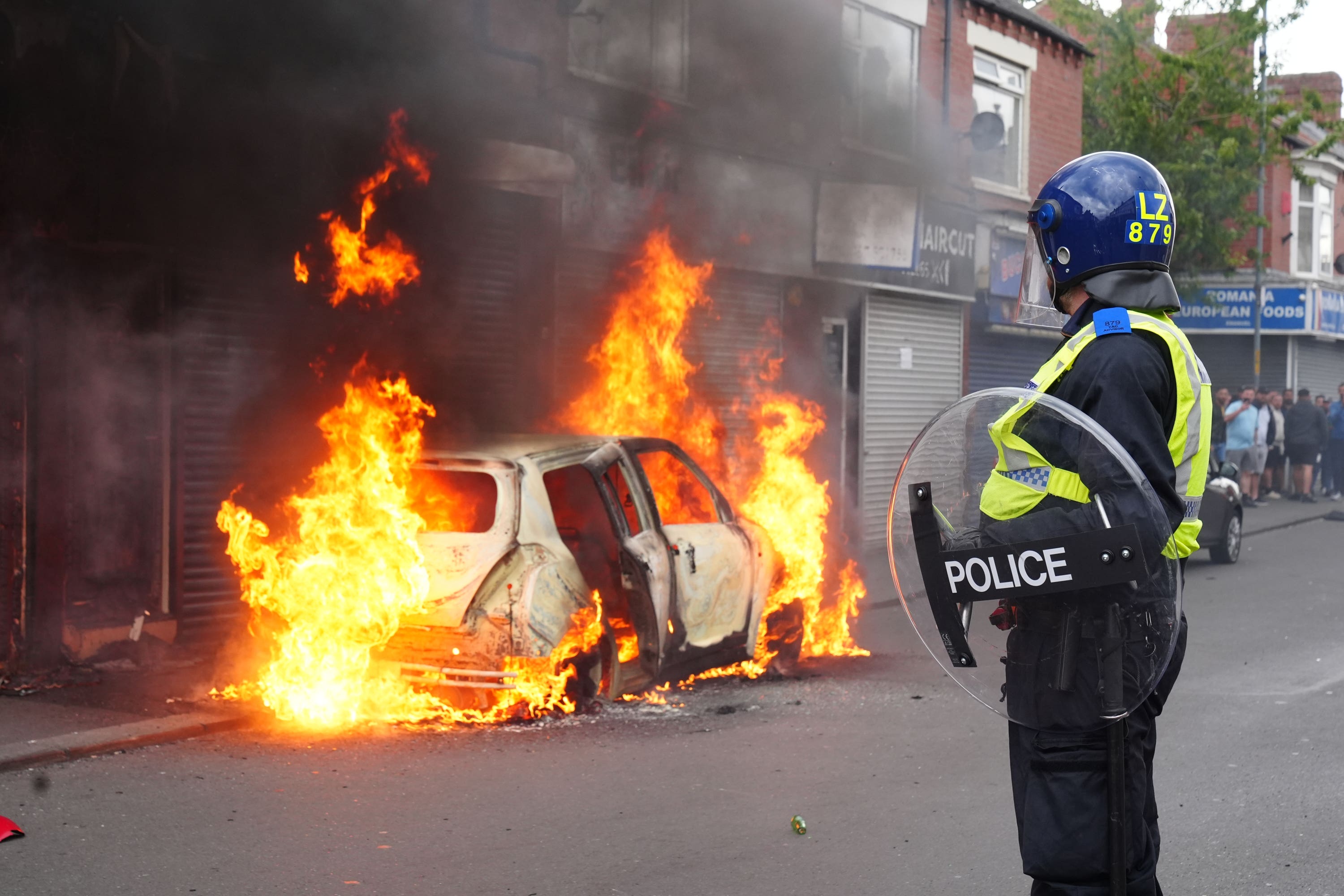Splitting far-right hardcore from sympathisers key to halting violence – expert
Professor Matthew Feldman divided the protesters into three groups: influencers, extremists and people attracted to the ‘carnival-like’ atmosphere.

Splitting hardcore racists from thousands of sympathisers attracted to lawless rioting is key to preventing more “far-right thuggery”, an expert on the extreme right-wing has said.
Professor Matthew Feldman was “shocked but unsurprised” by the unrest sparked by the Southport stabbings and warned there could be more to come before the summer is out.
He told PA news agency: “It could well be this isn’t the last weekend we see these types of protests and the level of violence could get worse.
“This has been building over the last few days – and realistically far longer than that – to the point where we are at 200-plus arrests, more than three-score injuries to police, millions in costs.
The places that are targeted are places of worship, especially of Muslim places of worship or places that house asylum seekers. These are the types of issues that have animated the far-right for decades
“At the time we are speaking, there is still disorder going on in Bolton, Rotherham and Middlesbrough and elsewhere.”
Rather than condemning all demonstrators as “far-right” extremists, Prof Feldman called for a “more nuanced approach”.
He said: “I agree with the Prime Minister’s powerful statement that this is far-right thuggery.
“The places that are targeted are places of worship, especially of Muslim places of worship or places that house asylum seekers. These are the types of issues that have animated the far-right for decades.
“But I am not yet ready to say the many thousands of people turning up are far-right.”
He identified three groups: “far-right influencers” operating online; individual far-right extremists associated with groups like Patriotic Alternative and Britain First who came from out of town to “inflame sentiment and ratchet up tensions”; and a third group.
Prof Feldman said he was not ready to “write off” those people in the last group who may be drawn to the “allure” of a “carnival-like atmosphere”.
He said: “They may be motivated by particular issues, misinformation, even legitimate concerns about immigration expressed in a very wrong way but I think a big part of this group are drawn to the carnivalesque atmosphere.
“Let’s be realistic, that means some degree of dress-up, in particular masks, a certain anonymity in crowds and above all the opportunity to break some social norms and taboos.
“This could be chanting things that might get you arrested unless you are amongst a crowd, or throwing things at police, right the way through to burning up shops and other outrageous activities.
“I think we need to peel off this group of sympathisers from people who are hardened racists. Just dismissing them all as far-right isn’t incorrect because they are involved in far-right thuggery.
“But I think we can do better in trying to understand the different dynamics in play – people who are whipping up hatred, people who are motivated by hatred and people who are maybe doing hateful things.
“Separate the sympathisers from the hardcore and start thinking in terms of ‘alternative narratives’ for how we might engage with this audience.
“It needs to be a serious grown-up conversation. We should not be seeking to shut down difficult conversations.”
Prof Feldman was speaking as Prime Minister Sir Keir Starmer vowed to crack down on those involved in the disorder or “whipping up this action online and then running away”.
The Academic Consulting Services director said it was urgent to speed up the implementation of the Online Harms Bill to prevent future unrest fuelled by the spread of “lies” on social media.
He said: “Having read through that Bill today, I don’t see much thought given to compelling social media action around online propaganda and incitement to offline criminality.
“There is no question what fanned the flames was disinformation and we have seen the results: hundreds of arrests, scores of injuries, millions in damages and many communities operating under a sense of fear.”
Prof Feldman said the hot temperatures in the summer “to some degree” also impacted on protests.
He suggested providing people working on the front lines with “accurate, reliable, unbiased information” was vital in tackling online disinformation.
And there were “searching questions” for social media companies, Prof Feldman said: “They need to be asking themselves about how they get to a place where social media is better for society than it is now.
“We all know there can be positive aspects for social media. Surely it cannot be in social media companies’ interests to be associated with what clearly looks to be a radicalising agent in events like this and elsewhere around the world.”
Bookmark popover
Removed from bookmarks